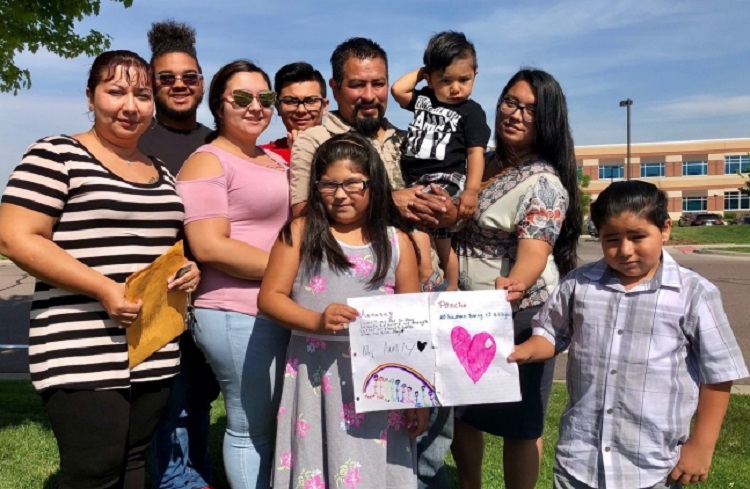
Christina (left), her husband, Jorge (center), with their family in Colorado. In 2020, Jorge was deported to Mexico, and Christina continues to fight to bring him back home to the U.S. and push for a roadmap to citizenship for all immigrants. Gabriela Flora / AFSC
Christina and Jorge met in Colorado in 2000, fell in love, and got married in 2005. As a U.S. citizen, Christina assumed she could easily apply for citizenship for Jorge, who was undocumented, and be approved. As part of the application process, Jorge left for Mexico, hoping to be back quickly. Instead, the U.S. consulate wrongly denied their application in 2007. With Christina pregnant with their fourth child, and their separation going on longer than planned, Jorge decided to make the dangerous journey to return to his family in the U.S.
The couple continued with their lives in Colorado until 2008 when Jorge was driving home from work, underestimated a curve, and hit a guardrail. Back then, Jorge couldn't obtain a Colorado driver's license due to his immigration status. Despite full insurance and no damage to any other vehicle, the sheriff arrested Jorge, triggering deportation proceedings. For over a decade, the family fought to stay together. But during a scheduled immigration check-in in November 2019, Immigration and Customs Enforcement (ICE) detained Jorge and then deported him to Mexico.
“Back in the U.S., my family needs me, and I need them even more." — Jorge
"Those of us who've been deported must wait for three, five, 10, or like me 20 years—or sometimes banned from reuniting with our families," says Jorge, who is still in Mexico. "We are fighting for the right to return home and pursue citizenship; to reunite with our loved ones, and to be forever happy."
Jorge and Christina’s story is just one of the millions of people the government has separated from their loved ones in the U.S. over the past decade. Their story is echoed in the estimated 11 million undocumented people in the U.S. who are vital parts of our communities—but struggle every day because they are denied the opportunity to obtain citizenship in the country they call home. Every day, more families and communities are harmed, caught in the web of cruel and unjust detention and deportation policies. And many more live in fear that they could one day lose their homes, jobs, and more.
“In North Carolina, to be undocumented means to have a fear of leaving the house to drop off your kids at school, because you live in a county where the police works with ICE and a traffic ticket can lead to the separation of your family,” says Kelly Morales, AFSC North Carolina Immigrant Rights program director. “It means not being eligible for in-state college tuition, despite having lived here more than half your life. It means being excluded from any economic relief that the country and state provides for working-class families struggling to keep food on the table during a pandemic.”
Action from Congress is long overdue
Today we must recognize and affirm immigrants as members of our communities and answer their call to honor their humanity by providing all people with a pathway to citizenship.
Thanks to the extraordinary grassroots organizing and tireless advocacy across the country by undocumented immigrants, their families, and allies over decades, we see an opportunity for bold action. President Joe Biden has announced his support for a roadmap to citizenship for most undocumented immigrants who were in the U.S. as of Jan. 1, 2021—a significant step forward for communities that face tremendous barriers to gaining permanent status.
Historically, various programs have offered certain groups of immigrants modest protections. Still, these programs have fallen short of truly offering all immigrants relief and the stability of knowing they can live, work, and participate in society without fear of deportation. Attacks by the Trump administration on programs like Deferred Action for Childhood Arrivals (DACA) and Temporary Protected Status (TPS) are reminders of why Congress must offer permanent protections through legislation.
Citizenship would be life-changing for people like Regine*, who is from Haiti and has TPS, which grants temporary protection from deportation to people from certain countries afflicted by natural disasters, war, or other dangerous conditions. TPS has allowed Regine to work and care for her U.S. citizen daughter for years, but when the Trump administration sought to end TPS for Haiti and other countries, hundreds of thousands of people like Regine were left in limbo.
“I feel lost,” Regine says. “With the ending of the TPS program, I [didn't] know what to do. If I have to go back to Haiti, it will be devastating.”
Recently the Biden administration redesignated TPS for Haitian nationals for 18 months, protecting many like Regine from deportation for now. However, hundreds of Haitians without TPS who are seeking asylum in the U.S are still being deported under the administration.
Under multiple administrations, Congress refused to take action, instead increasing already bloated budgets for immigration enforcement agencies. Detentions and deportations soared as administrations created programs that forced collusion between local police and ICE and introduced policies that criminalized migration. Congressional leadership’s inaction compounded the attacks on our communities. It is insufficient to simply expand existing immigration policies that have excluded many people, fail to address real needs, and offer only temporary relief. The responsibility to heal the harm done, provide permanency, and transform our laws lies with Congress in this moment—especially Sen. Majority Leader Chuck Schumer, House Speaker Pelosi, Senate Minority Leader Mitch McConnell, House Minority Leader Kevin McCarthy , and members of the Judiciary committees.
How we move forward

Currently, advocates are urging Congress to put as many as 11 million people on a roadmap to citizenship by using a budget package that does not require a supermajority vote for passage.
Both the House and Senate will be considering legislation to offer permanent protection for undocumented immigrants, such as the Citizenship for Essential Workers Act, the Dream and Promise Act (HR6), and the Farm Workforce Modernization Act. But these bills are far from perfect. Some provisions in HR 6 and the Citizenship for Essential Workers Act could leave many people behind—including people who have had any contact with the racist criminal legal system. The current exclusions for criminal history in the Dream and Promise Act, Farm Workforce Modernization Act and the Citizenship for Essential Workers Act are deeply incompatible with this reform movement. These bills layer new and unprecedented criminal exclusions on top of the already horrific bars in current immigration law.
Also bills like the Farm Workforce Modernization Act fall woefully short of achieving true protections for farmworkers. The bill creates a limited and complicated path to legal status for farmworkers, expands an already exploitative H-2A program without necessary oversight, and unfairly makes the E-Verify system mandatory for the entire agricultural industry.
We need legislation that fully addresses the needs of every member of our community. That legislation must:
- Create a clear, inclusive, transparent, and timely roadmap to permanent protections and citizenship for all 11 million undocumented immigrants in the U.S.—without exception.
- Prioritize reunification with loved ones and families; eliminate decades-long backlogs in processing family visa applications as well as five- and 10-year bars on family applications for family members who were deported; and create avenues to bring back to the U.S. people who were deported.
- Respect the human, civil, and labor rights of all immigrants by ending detention and deportation, providing full access to public services and benefits, and ensuring immigrants’ rights and dignity are respected in places of work.
We cannot settle for any less.
With Jorge still in Mexico, Christina, who is in the U.S. with their children, says her family has “suffered unreasonable trauma over all of these years. I worry about Jorge's health. I don't know how much longer I can sustain our family financially as a single mother. This separation broke our family mentally and emotionally a long time ago. Any immigration reform must provide a path to reunification, and our government must recognize the deep wounds deportation has caused to us all.”
As U.S. immigration policy continues to threaten the lives and livelihoods of people like Jorge, Christina, Regine, and millions of others, it’s as urgent as ever to advocate for legislation that honors immigrants as members of our community. We must also ensure that legislation creating a roadmap to citizenship does not increase immigration enforcement or the militarization of communities. Instead legislation should address root causes of migration, affirm the rights of all, and invest in services to welcome immigrants and promote the health and well-being of our communities.
We hope you will join us in our efforts to call for permanent solutions to keep families, loved ones, and communities together.
Write Congress today: Pass legislation that creates a pathway to citizenship for all immigrants!
